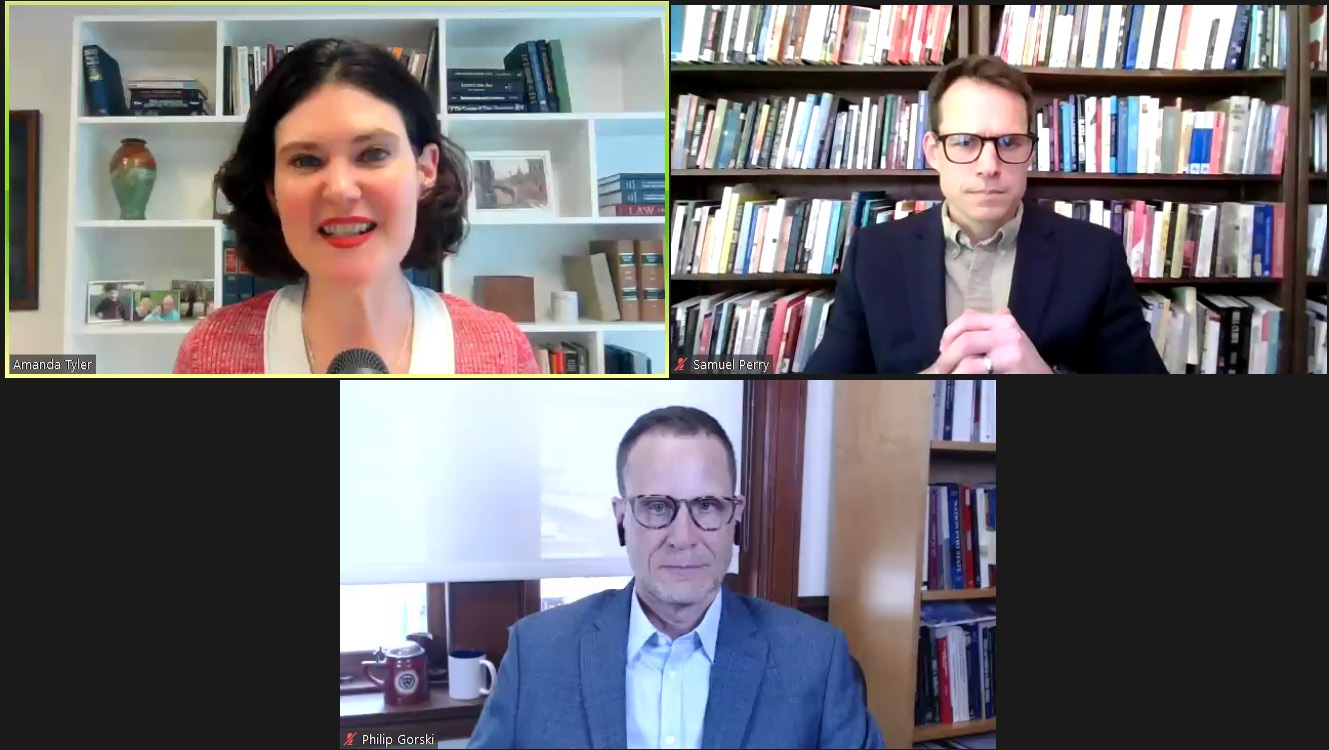Bringing more engagement to the fight against Christian nationalism
Authors of The Flag and the Cross share research and reactions to the dangers of white Christian nationalism

By Evie Bull, BJC Intern
“Freedom for me and order for thee … even if my freedom infringes upon the freedom of others to practice their faith or to give their opinions.” According to Dr. Philip Gorski, that’s often the mindset behind the discriminatory and violent nature of the white Christian nationalist movement.
Dr. Gorski and Dr. Samuel Perry are the co-authors of The Flag and the Cross: White Christian Nationalism and the Threat to American Democracy, and they discussed their research and new book in a webinar hosted by the Christians Against Christian Nationalism campaign on May 16. Moderated by BJC Executive Director Amanda Tyler, the conversation explored the current threat of white Christian nationalism.
Dr. Perry is an associate professor of sociology at the University of Oklahoma and Dr. Gorski is the chair of the sociology department at Yale University. Their goal with the new book is to unite people who may disagree on other issues.
They discussed the need to create a sense of urgency for people who do not view white Christian nationalism as a problem. Dr. Perry pointed out that we can be deceived by the loud voices we see on social media — research shows that most Americans are still somewhere in the middle and are not very engaged or aware of the danger of Christian nationalism.
When asked to describe white Christian nationalism, Dr. Gorski explained that the thought process of a Christian nationalist is often, “God gave the United States some kind of special mission and — in order to achieve that mission and to bless that mission — gave the United States incredible power and prosperity.” He said that mission and prosperity seem to be in danger “by the presence of non-Christians or non-whites or non-native-born people, whoever the ‘other’ of the day happens to be.”
Dr. Perry then explained that freedom, order and violence are three pillars of the white Christian nationalist movement.
“The people in power — white Christian men, primarily — get the freedom,” he said, noting that everyone else — people of color, people who aren’t Christian, women, sexual minorities — gets the order. He said if those other groups violate the order, white Christian men feel they are “justified in perpetrating violence,” noting that white Christian nationalism is associated with strong support for “authoritarian violence” that supposedly keeps the peace.
Dr. Perry and Dr. Gorski used this foundation to discuss the tragic shooting in Buffalo, New York, that took place just two days before the webinar. The shooter — who shot and killed ten people and injured three others — shared white Christian nationalist values in his writing, and those seemed to motivate his violent actions. “Replacement theory” can help explain these values, too, which can be described as the feeling that “other people” are taking over and “we” need to protect America from “them.”
Dr. Gorski elaborated on how best to engage a diverse audience in the conversation surrounding this movement, especially with those who may be at risk of falling into this category.
“Pointing fingers to people usually is a conversation stopper,” Dr. Perry said. “Something that we have sought to do throughout all of our discussions is not to call people ‘white Christian nationalists.’” The ideology of Christian nationalism, he noted, can be described as a spectrum along which anyone may find themselves, which is a more helpful framing for dialogue and understanding than throwing around the label “Christian nationalist.”
“Let’s talk about it as an ideology that is anti-Christian, that is anti-democratic,” Dr. Perry said.
After discussing the pressing dangers of the spread of white Christian nationalism, Tyler asked the important question of what can be done now to push back on white Christian nationalism.
Dr. Gorski mentioned the importance of “intentionally fostering relationships and trust across some sort of deep differences that we have in contemporary society.” He continued, “There’s lots of good scholarship to show that one of the ways to break these cycles of polarization that lead to violence is to build in circuit-breakers.” These circuit-breakers, he said, can be anyone who acts as an ally to those in their own communities in ways that foster acceptance. According to Dr. Gorski, these individuals have a responsibility to help people who may feel at risk of becoming a victim of this violence to feel safe.
Both Drs. Gorski and Perry highlighted the importance of Christians and non-Christians to unite with the common goal of fighting against these harmful ideologies that are putting American democracy at risk. A recording of the full conversation is available on BJC’s YouTube page.
Visit ChristiansAgainstChristianNationalism.org for a variety of resources, including curriculum and discussion guides for group conversation, a one-page resource defining Christian nationalism, and a statement you can sign and share online.




